Development of a Project Based Arduino Uno R3- Assisted Robotic Training Design
Downloads
Downloads
J. Davies, "Read the Arm 2020 Global AI Survey: AI Today, AI Tomorrow is a guidebook to how people feel about AI technology already reshaping many human experiences in 2020." Accessed: Apr. 08, 2024. [Online]. Available: https://newsroom.arm.com/blog/read-arm-2020-global-ai-survey
C. J. Bonk, M. M. Lee, X. Kou, S. Xu, and F.-R. Sheu, "Understanding the self-directed online learning preferences, goals, achievements, and challenges of MIT OpenCourseWare subscrib-ers," J Educ Techno Soc, vol. 18, no. 2, pp. 349–368, 2015.
T. Huriah, M. Kep, and S. K. Kom, Metode student center Learning: Aplikasi pada pendidi-kan Keperawatan. Kencana, 2018.
M. P. Suyitno, "Pendidikan vokasi dan kejuruan strategi dan revitalisasi abad 21," Purwore-jo: K-Media, 2020.
A. Sutama, H. Wijoyo, I. Indrawan, and B. Usada, "Manajemen pendidikan vokasi." CV. Pena Persada, 2020.
P. Nurwardani et al., Panduan Penyusunan Kurikulum Pendidikan Vokasi. Jakarta: Kemen-terian Riset, Teknologi dan Pendidikan Tinggi Direktorat Jenderal Pembelajaran dan Kema-hasiswaan, Direktorat Pembelajaran, 2016.
B. Bejamin, T. Malusa, and A. Rahmat, "Pengembangan Sumber Daya Manusia (Teori, Di-mensi Pengukuran, dan Implementasi dalam organisasi)," Yogyakarta: ZAHR Publishing, 2017.
B. A. Pribadi, Desain dan pengembangan program pelatihan berbasis kompetensi implemen-tasi model ADDIE. Kencana, 2016.
B. Siswanto, Manajemen tenaga kerja: ancangan dalam pendayagunaan dan pengembangan unsur tenaga kerja. Sinar Baru, 1987.
H. Riniwati, Manajemen sumberdaya manusia: Aktivitas utama dan pengembangan SDM. Universitas Brawijaya Press, 2016.
M. Hasan et al., "Media pembelajaran." Tahta media group, 2021.
M. Ramli, "Media dan Teknologi Pendidikan." Banjarmasin: IAIN Antasari Press, 2012.
G. Gunawan and A. A. Ritonga, "Media Pembelajaran Berbasis Industri 4.0," 2020.
A. Kristanto, "Media Pembelajaran Surabaya," Bintang Sutabaya Anggota IKAPI Daerah Jawa Timur, 2016.
C. D. Nurwahidah, Z. Zaharah, and I. Sina, "Media video pembelajaran dalam meningkatkan motivasi dan prestasi mahasiswa," Rausyan Fikr: Jurnal Pemikiran Dan Pencerahan, vol. 17, no. 1, 2021.
A. Kadir, Simulasi Arduino. Elex Media Komputindo, 2016.
J. W. Leksono, W. HK, E. Indahwati, N. Yanuansa, and I. Ummah, "Modul Belajar Arduino Uno," vol, vol. 21, pp. 1–9, 2019.
Y. A. Badamasi, "The working principle of an Arduino," in 2014 11th international confer-ence on electronics, computer and computation (ICECCO), IEEE, 2014, pp. 1–4.
D. L. Kirkpatrick and J. D. Kirkpatrick, "Evaluating training programs: the four levels. Berrett." Koehler Publisher, Berkley, USA, 1998.
D. E. Vachrenisa, S. Sulthoni, and Z. Abidin, "Pengembangan Desain Program Pelatihan Info-grafis Bagi Pegawai PT Pelindo III (Persero) Surabaya," Jurnal Kajian Teknologi Pendidikan, vol. 3, no. 2, pp. 178–186, 2020.
T. M. Palupi and E. Tamela, "Pelatihan Google Workspace For Education Melalui Pembelaja-ran Berbasis Proyek Bagi Guru SMP," Panrita Abdi-Jurnal Pengabdian pada Masyarakat, vol. 6, no. 3, pp. 492–503, 2022.
Y. Yolanda and W. Arini, "Pelatihan robotic dan teknologi arduino bagi guru mipa dan pelajar sma/smk di wilayah kabupaten musi rawas," Jurnal Cemerlang: Pengabdian Pada Masyarakat, vol. 1, no. 1, pp. 1–11, 2018.
R. M. Branch, Instructional design: The ADDIE approach, vol. 722. Springer Science & Busi-ness Media, 2009.
D. Mardapi, "Pengukuran, penilaian, dan evaluasi pendidikan," Yogyakarta: Nuha Medika, vol. 45, 2012.




















